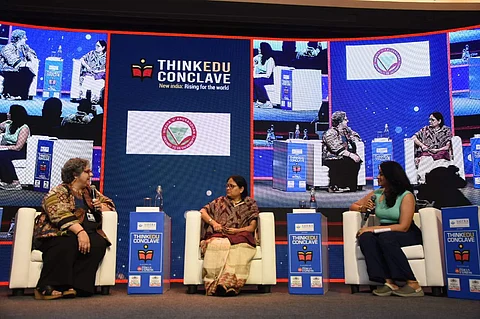

Dr Ramya S Moorthy, founder of Nimaya Robotics, and Sanghamitra Bandyopadhyay, director of the Indian Statistical Institute, spoke about their experiences as women in STEM fields and the challenges they faced due to their gender at the 12th edition of The New Indian Express' ThinkEdu Conclave 2023 in Chennai on Thursday, February 9. The session, entitled "Women in STEM: Factories of the Mind," was moderated by senior journalist Kaveere Kamzai.
Ramya said, “They wanted to know if the tech actually belonged to me. One of the panellists asked me when nobody else was able to think about it, why did you think of this technology? It doesn't sound right to me because it does not exist.”
Read also : Gender stereotypes from formative years shape political participation of youth
Sanghamirtha said that she did not face these issues but as a scientist, a director or as a colleague, she has faced multiple issues and problems, but she never equated that with her gender. “Once, I received a phone call and that person wanted to talk to the director, when I said yes, the person said, I want the director. So then I had to explain that I am the director that took some people by surprise, but I think this is not very unnatural, given the number of women who are out there. And this is changing,” she added.
Talking about her experiences while doing her degree, Ramya said she wanted to study mechanical engineering but her mother said that there were no girls in the mechanical department so she had to study electrical engineering.
Ramya said, “One of the things I made sure of was that I consciously changed my path. And in my master's I got into mechanical engineering, and that's how I took a master's in robotics. And then I continued pursuing my PhD in mechanical.”
Sanghamitra discussed the issue of working in silos and stated that women tend to isolate themselves in their work, but it's a self-imposed restriction and not imposed by others. She mentioned that breaking free from these silos is challenging for them.
She said, “But that realisation is that people are now collaborating across disciplines across institutions, but not to the desirable extent. And for that, for example, a biologist has to respect the mathematician, and the mathematician has to respect the computer scientists otherwise, every domain expert thinks that they can do everything on their own, which is not correct. That is why the work is suboptimal. If a computer scientist sits with a statistician who sits with a biologist, and this group together solves a problem, then the quality of that work will be much higher. That is why we are working but we are still not to that level.”
Speaking about the joy of her work, Ramya said that it was the best thing when parents reach out to her to give feedback. “A child who's not able to imitate but using our training system was able to imitate like ads on TV, or whatever the mom was doing in the house. That is when it gives me the utmost satisfaction. It makes a change to somebody who likely needs it. So that keeps me going,” she added.
Sanghamithra said that she felt she was part of a bigger puzzle when another independent group validated a biomarker that her team was working on some time ago. “My work has been mostly related to cancer. One of our discoveries was a biomarker. And we were only doing computational algorithms. So we were on the computer. We were doing some simulation studies, etc. But our expertise ended there. We published but a couple of years later we found that another group independently had validated that marker that was for breast cancer. So these are the things that give you a lot of joy that the work that you're doing, you know, has a place in that big scheme. ” she said.
The conclusion of the session saw both speakers concurring on the significance of educating boys about the fallacy of gender stereotypes. They emphasised that it's not about granting girls any special advantages, but rather about giving them the chance to pursue their interests and perform all types of work, regardless of gender norms. The speakers noted that statistics show that companies that have a higher proportion of women employees tend to perform better, making it a sound economic decision to support women in the workforce. They stressed that including women in society and allowing them to contribute is not an act of kindness but rather a necessary step toward a more equitable and productive society. This realisation must thus exist, they concurred.
“Women’s careers are careers, they are not hobbies,” Sanghamithra said.
